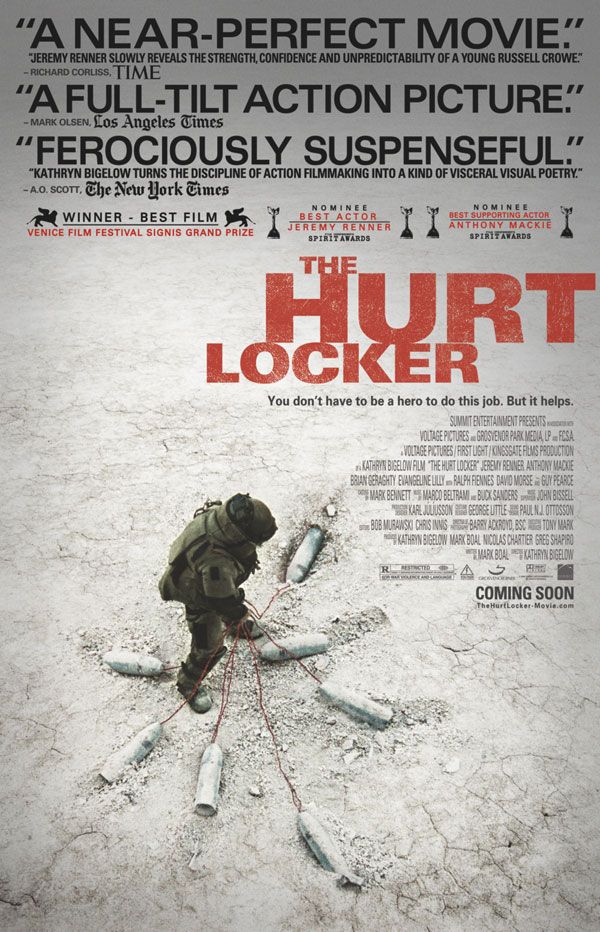It was bound to happen sooner or later. We now have a good Iraq War movie. After numerous attempts to deliver a critique of American military police all while stepping on egg-shells around the armed forces, Kathryn Bigelow's "The Hurt Locker", not only smashes those shells, it does it in the first ten minutes and lets you know that, gasp!, American soldiers aren't saints but they're human and far more interesting and compelling that way.
In a decision that seems so obvious that its astonishing no one American filmmaker has tried it until now, "The Hurt Locker" is an Iraq War movie actually set in Iraq. Not five or ten minutes and the remaining runtime focusing on the soldiers struggling with PTSD. "Hurt" throws you right into the action of three members of a bomb disposal unit: Specialist Owen Eldridge (Brian Geraghty), Sergeant JT Sanborn (Anthony Mackie), and new Staff Sergeant William James (Jeremy Renner). While James seems like an alright guy at first, the pragmatic and cautious Sanborn and the neophyte Eldridge soon realize that he's completely out of control. That's a concern when your day-to-day is spent cuddling up next to devices that are designed to, as James so casually puts it, "send us back to Jesus."
If there's a more pulse-pounding two hours of cinema this year, I don't want to see it because I'll have a heart-attack. Bigelow pulls her audience into a world where we understand that anything could explode at any time. At its center, Renner crafts a fresh and complex character with James as a man whose only way to be in control is to be completely out of control. He's reckless, he may be an adrenaline-junkie, but he gets the job done. The film opens with the line that "War is a drug," but we've never seen a character as addicted to the battle as James.
All future "Iraq War" movies will have to take note that you can still revere the troops and appreciate their work but you dishonor them as individuals if you simply tell their stories as hagiographies. Eldridge is scared to death and feels certain he'll die in combat; Sanborn is the responsible and pragmatic one but as he constantly clashes with James, the cracks in his armor begin to show and we see how he's clinging so desperately to the rules of engagement just as Eldridge is clinging to the strength of his superior officers just as James is clinging to the next opportunity for something to kill him. It's only natural that in order to survive, everyone must find something or someone to believe in but "The Hurt Locker" has the balls to say that it's not as huggable as family or friends or religion or country.
Geraghty and Mackie both turn in strong performances but the film truly belongs to Renner. Heralded as a promising young talent through most of the past decade, Renner finally makes good on that promise with his performance here. That's not to diminish his prior work but its one of those fantastic moments when a potentially great actor finally meets the material that provides a wake-up call to audiences. Renner charms us while at the same time gradually revealing his supposed strength as his greatest weakness.
"The Hurt Locker" is the Iraq War film both audiences and the troops deserve. Bigelow already understands that no one who sees this film needs to be told that our troops are honorable men and women. But honor is meaningless without context and so her film strives for honesty and complexity all wrapped-up in a ticking time bomb of action that blows away ponderous conversations and armchair politics. While we all want this war over and our troops home, I hope this film isn't the last good look we get at this conflict.
Rating ------ B plus


.jpg)
